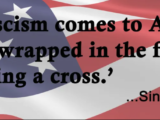The Big Picture –
By Glynn Wilson –
The biggest threat to the future of humanity, democracy and the inherent rights of life, liberty and the pursuit of happiness is the muddled thinking of men.
Feel free to quote me on that.
For example, as I was re-reading the Supreme Court decision in Dobbs v. Jackson, which upended 50 years of established law by overturning Roe v. Wade (full text, PDF) I was struck by the muddled thinking by this court and the decision’s author, Justice Sam Alito, on the subject of “liberty.”
Excerpt:
Historical inquiries of this nature are essential whenever we are asked to recognize a new component of the “liberty†protected by the Due Process Clause because the term “liberty†alone provides little guidance.
“Liberty†is a capacious term.
[capacious=adjective: having a lot of space inside; roomy. “…she rummaged in her capacious handbag.” ]As Lincoln once said: “We all declare for Liberty; but in using the same word we do not all mean the same thing.†In a well-known essay, Isaiah Berlin reported that “[h]istorians of ideas†had cataloged more than 200 different senses in which the term had been used.
In interpreting what is meant by the Fourteenth Amendment’s reference to “liberty,†we must guard against the natural human tendency to confuse what that Amendment protects with our own ardent views about the liberty that Americans should enjoy. That is why the Court has long been “reluctant†to recognize rights that are not mentioned in the Constitution. Collins v. Harker Heights, 503 U.S. 115, 125 (1992).
“Substantive due process has at times been a treacherous field for this Court,†Moore v. East Cleveland, 431 U.S. 494, 503 (1977) (plurality opinion), and it has sometimes led the Court to usurp authority that the Constitution entrusts to the people’s elected representatives. See Regents of Univ. of Mich. v. Ewing, 474 U.S. 214, 225— 226 (1985). As the Court cautioned in Glucksberg, “[w]e must … exercise the utmost care whenever we are asked to break new ground in this field, lest the liberty protected by the Due Process Clause be subtly transformed into the policy preferences of the Members of this Court.†521 U.S., at 720 (internal quotation marks and citation omitted).
On occasion, when the Court has ignored the “[a]ppropriate limits†imposed by “‘respect for the teachings of history,†Moore, 431 U.S., at 503 (plurality opinion), it has fallen into the freewheeling judicial policymaking that characterized discredited decisions such as Lochner v. New York, 198 U.S. 45 (1905). The Court must not fall prey to such an unprincipled approach. Instead, guided by the history and tradition that map the essential components of our Nation’s concept of ordered liberty, we must ask what the Fourteenth Amendment means by the term “liberty.â€
When we engage in that inquiry in the present case, the clear answer is that the Fourteenth Amendment does not protect the right to an abortion.
What?
The relevant clause in Section One of the 14th Amendment reads:
“All persons born or naturalized in the United States and subject to the jurisdiction thereof, are citizens of the United States and of the State wherein they reside. No State shall make or enforce any law which shall abridge the privileges or immunities of citizens of the United States; nor shall any State deprive any person of life, liberty, or property, without due process of law; nor deny to any person within its jurisdiction the equal protection of the laws.”
Women are people too. They deserve the equal protection of the law.
If a graduate from Princeton and Yale Law School is having such a hard time figuring this out, and is willing to set off a dangerous political revolution because he doesn’t understand it, how is the average American to know what to think and do?
Where do most people go to find the definition of words and concepts these days? Google.
So go online to Google and simply type in the words “liberty” and see what you find. The first thing that comes up in Google Chrome is Liberty University, a private Christian college in Virginia where they actually teach this muddled thinking to students and get away with profiting from it.
People also ask:
Whats (sic) liberty means?
1: the quality or state of being free – a, the power to do as one pleases; b, freedom from physical restraint; c, freedom from arbitrary or despotic … control.
Does liberty mean freedom?
As used in (the) Constitution, liberty means freedom from arbitrary and unreasonable restraint upon an individual. Freedom from restraint refers to more than just physical restraint, but also the freedom act according to one’s own will.
What’s the difference between freedom and liberty?
Liberty is defined by the Oxford dictionary as “The state of being free within society from oppressive restrictions imposed by authority on one’s way of life, behaviour, or political views†while freedom is defined as “The power or right to act, speak, or think as one wants.â€
What are examples of liberty?
Liberty is defined as freedom from captivity or control. An example of liberty is the ability to go where you want, do what you want and say what you want.
Forget Google. It is for the stupid.
Merriam-Webster defined liberty as a noun that means:
1: the quality or state of being free:
a: the power to do as one pleases
b: freedom from physical restraint
c: freedom from arbitrary or despotic … control
d: the positive enjoyment of various social, political, or economic rights and privileges
e: the power of choice (emphasis added)
2 a: a right or immunity enjoyed by prescription or by grant.
In other words, as PRIVILEGE.
b: permission especially to go freely within specified limits was given the liberty of the house.
3: an action going beyond normal limits: such as
a: a breach of etiquette or propriety;
FAMILIARITY: took undue liberties with a stranger;
b: RISK, CHANCE: took foolish liberties with his health
c: a violation of rules or a deviation from standard practice, took liberties in the way he played the game
d: a distortion of fact: The movie takes many liberties with the actual events.
Or a Supreme Court that engages in judicial activism and imposes it’s political opinions on the people while attacking judicial activism and judges for imposing their opinions on the court.
So what’s so hard to understand about that?
In the context of American democracy, the founders depended to a large extent on the writing of philosophers at the time, such as John Locke. His definition of liberty?
“The natural liberty of man is to be free from any superior power on earth, and not to be under the will or legislative authority of man, but to have only the law of nature for his rule.”
Part of the problem with Alito and other Federalist Society members and appointees of Republican presidents on this court is that they fool themselves into muddled thinking by calling themselves “originalists,” which is the legal equivalent of “fundamentalism” in religion and is somehow tangled up in the same school of muddled thinking gripping this world and country like a plague (meme).
In the context of our law, originalism is a capacious concept regarding the interpretation of the Constitution that asserts that all statements in the constitution must be interpreted based on the original understanding “at the time it was adopted,” which is as absurd as arguing that every word in the Holy Bible is “literally true.”
This notion stands in contrast to the concept of the Living Constitution, which asserts that the Constitution should be interpreted based on the context of current times and political identities, even if such interpretation is different from the original interpretations of the document. Originalism should not be confused with strict constructionism, although it is a close incestuous cousin in the school of muddled thinking.
To fully understand what the brilliant founders of the Republic of the United States were thinking, you can’t just rely on what they voted to approve as a Constitution on June 21, 1788 anyway. They established a system designed to adapt to change over time, with checks and balances between the three branches of government and the states.
Other documents are as important as the Constitution itself, most notably this one.
Declaration of Independence: A Transcription
The relevant clause:
“We hold these truths to be self-evident, that all men are created equal, that they are endowed by their Creator with certain unalienable Rights, that among these are Life, Liberty and the pursuit of Happiness.
“That to secure these rights, Governments are instituted among Men, deriving their just powers from the consent of the governed…”
So substitute the word “people” for men, and see what you get. Do these right-wing judges like Clarence Thomas really think the founders meant for only property owning males of the species to have rights in perpetuity? We changed that a long time ago, and the rights of women are also part of the “living constitution.”
There is no going back to the original.
If that were the case, Thomas himself, as a Black man, would only be considered three-fifths of a person, and would certainly not have the right to sit on this nation’s highest court and have his wife interfere in our democracy to support a tyrant like Trump.
Article one, section two of the Constitution of the United States declared that any person who was not free would be counted as three-fifths of a free individual for the purposes of determining congressional representation. The “Three-Fifths Clause” thus increased the political power of slaveholding states at the time.
Should we also go back to allowing the South to legalize slavery for people with a dark skin color?
Absurd, and even a dumbass redneck with an IQ of 100 or less ought to be able to understand that. But not our illustrious Supreme Court.
Clearly the middled thinking that led to this Supreme Court ruling includes a political purpose intended by the members of the majority on the court (contrary to what they said) to protect the right to life of the unborn fetus. They go to great lengths in the decision to review the science and pseudo science on that, and ignore the very teaching they all say they depend on in their own lives. They also testified about their “faith” mostly as Catholics during their confirmation hearings, asked that inappropriately by Senate Republicans. The Bible defines life as “breath,” and if that were the standard, no unborn fetus would be safe.
But what about the life of the women who for centuries had to endure the oppression of pregnancy?
When forced by men into the servitude of constant motherhood, how could women ever be free enough to pursue their own lives, liberty and pursuit of happiness?
Roe may not have been the most brilliant decision ever written by the U.S. Supreme Court, but at least it did recognize that female citizens also have rights of due process and equal protection of the law, along with their own rights of life, liberty and property.
They no longer have that federal right.
They do have the right to vote still, and the right to organize and take this battle to the states, where it is hoped they will join the fight and let these corrupt men know where they stand and overturn this oppressive thinking.
Nowhere in the original constitution does it say anything about letting one man who can get a mob to side with him should have the power to rule in this country as a dictator who is above the law. In fact, the Constitution was based on the premises set out in the Declaration of Independence, and it was all about establishing “liberty” from a tyrant king.
In contradiction to their own “originalist” views, these men would have us go back even before there was a United States of America to the days of a church-run monarchy.
I often wonder if that is what they talk about amongst themselves in the Supreme Court lounge, sipping the best Scotch like kings with not a care in the world about the need for money or their future with their lifetime appointments and hefty salaries, health care benefits and retirement accounts. Do they whisper about the dangers of real “liberty” among the rabble and wish to erase the concept from the Constitution?
Maybe next they would like to declare liberty unconstitutional, since it is not mentioned in the Bible or the original text of the Constitution, only the amendments, changes that came later.
If that is what they really want, let them come out and say it and write that in their next decision, so everyone can know what we are really arguing about. A capacious handbag indeed.
And let’s see if that stands up to the test of a vote, or who will then be coming after them with bear spray, the point of a flag spear and a rope.
___
If you support truth in reporting with no paywall, and fearless writing with no popup ads or sponsored content, consider making a contribution today with GoFundMe or Patreon or PayPal.















Good one! Let’s hope that we can balance the SC and get our country back to a place where EVERYONE is free and equal under the law.
Virtually ANY noun can be construed as “capacious” – if the intent of the ‘user’ is to enlarge the ‘dick-shun-nary’ of misdirection to evade substance. By saying both ‘nothing’ AND ‘anything’, Thomas remains the GOP ‘token’ that belies all feints toward ‘equality’ by the white supremacy that is the ONLY skeletal strength of the Chamber of Commerce/country club Bridge society of the GOP (Grand Olde Patricians).